Bill King
Oakland A’s Broadcaster
The BARD Interview
By Jason Jackson
From The Bay Area Radio Digest, March 1990
EDITOR’S NOTE: Wilbur “Bill” King died on October 18, 2005, at age 78. At the time of his death, he was well into his sixth decade as the premier sports play-by-play voice in Bay Area radio history, having been an announcer for the Giants, Warriors, Raiders, A’s, the University of California, and the Western Hockey League’s San Francisco Seals, as well as hosting a daily sports roundup program for many years. He was inducted into the Bay Area Radio Hall of Fame in 2006 as a member of the first class to be honored.

TAKE ANY GATHERING OF EVEN semi-knowledgeable baseball fans and mention the phrase, “How ’bout that!” and the odds are that every member of the group will shout “Mel Allen!” in unison. Say “Bye-bye, baby!” and they’ll yell “Russ Hodges.” To “Tell it goodbye,” they’ll respond “Lon Simmons.” A throaty “Yesss!” could mean no one but Marv Albert.
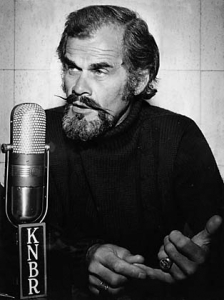
Not every well-known sportscaster is remembered by a favorite catch-phrase (can anyone remember Phil Stone’s?), but others wear theirs as a comfortable trademark, a badge of fan acceptance.
Sort of like “Holy Toledo.”
It has been used to register disgust and triumph, amazement and anguish. It has been used to punctuate Super Bowls and World Series, college basketball and minor-league hockey. It’s meaning is more obscure than “Bye-bye, baby,” although the hallowed Toledo must surely be the one in Spain; too many of us have seen the Ohio variety to believe otherwise.
To anyone who has heard him over the past thirty years in the Bay Area calling University of California football and basketball, Giants baseball, San Francisco Seals hockey, Warriors basketball, Raiders football and, since 1980, Oakland A’s baseball, the words “Holy Toledo” can only bring one voice and one face to mind.
Bill King, along with equally legendary broadcast partner Lon Simmons and Ray Fosse, will be calling the action for the World Champions once again this season on KSFO-AM 560 and the A’s radio network.
We caught up with him at his Sausalito home the evening after the owners’ lockout ended, as he prepared to leave for Phoenix and Spring Training with the Athletics.
THE BARD: What made you first get interested in becoming a sportscaster?
KING: (He laughs.) Oh, it goes back a long way. I was always involved in sports as a kid, as a participant. At the same time, I was always involved in things vocal when I was in school; not so much that I sought it. It just seemed to fall to me from the time early in grade school when teachers would quite frequently call on me to do a lot of reading aloud in class. In high school I was involved in speech courses, dramatics and things like that, but with never any thought other than it was a lot of fun.
The evolution of events was that when I was in the service in the late forties, we had a very good baseball team at Fort Knox, but eventually, I got shipped out of there to Guam. When I got to Guam I was in an office job, driving a staff car for a colonel who was sort of a throwback to another era. He lived in the militaristic ideology of about 1890. He was not pleasant to work for. He was also a guy who believed there should be only two classes: officers and lowly privates. As time evolved over a period of weeks, I thought, for my own good, that I ought to try and get out of there. It was a matter of expediency more than anything else, trying to figure out what I might do to execute that desire.
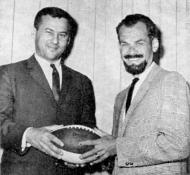
Suddenly a light bulb lit up. The Armed Forces Radio Service had a station on Guam. Obviously, that’s what everybody listened to, so I just took a flyer and went up there and talked to the Navy enlisted man who was the manager of the station. One thing led to another, I did an audition, he said, “Can you get a transfer?” and I said, “I’ll see.”
The transfer wasn’t easy, but it was fortuitous that the one guy who was able to swing it for me was a major and a roommate of another officer who didn’t want me out of the company. This guy for some reason liked me and passed on the transfer, and I went to WXLI, The Voice Of Guam.
I was there for about a year or so, doing all the things that you do on radio except for sportscasting. It was a cushy deal. In fact, I liked it so much I tried to stay out there another six months because I loved it in the tropics and I really had a great deal, and it was fun.
When I came back here, I took stock of my options. I was still a teenager, and the options were, number one, to play baseball on the Class D level; that was in the era when we had AAA through D down the ladder in the minor leagues. Number two was to go to the University of Illinois and play baseball for a coach I liked very much, and number three was to take a shot at radio.
I wound up opting for the latter, not really thinking at the time about sportscasting because that wasn’t a very prevalent job at that time; it was only in the major markets. Until just after World War II, there were very few stations on the small-city level that dealt with sports, so I never really gave it a lot of thought. I just assumed, I guess, somewhere in the deep recesses of my mind, that people were born sportscasters in big cities. I never considered how they evolved or anything. Anyway, I went to work at a small town in Illinois on a 250-watt radio station for $27.50 a week, doing everything, literally: sweeping out, opening the station in the morning.

We, the announcing staff, were all just kids, but the program director was a guy who had had some pretty good jobs as a sportscaster in some nearly-major markets, places like Birmingham, but he’d often had problems with alcohol. He’d gotten himself together and had gotten on the wagon and was the sports director and the program director, and was sort of a pillar at this little radio station. But the station then lured him into evil deeds and he fell off the wagon and disappeared.
Suddenly they needed somebody to read the sports news one evening and I was it, and that was the start. (He chuckles.) That’s a very long-winded answer, but I haven’t quite figured out how to condense it yet.
THE BARD: When you were growing up, was there a voice on the radio you heard that made you think, “Now that’s what I’d like to do with my life”?
KING: There was one voice in particular. I was an avid sports person, both as a player and as an observer, spectator and listener, and that was Bob Elson, who is now in the broadcasters’ wing of the Hall of Fame in Cooperstown. Bob Elson at that time was the major broadcaster in Chicago. They had three very good broadcasters all doing major league baseball there in an era when there was no exclusivity. Elson was the guy I used to always listen to.
THE BARD: After simply reading the sports news, what was your next job in sportscasting?
KING: Oh, doing small-town football and basketball, the local high school team.
THE BARD: So the voice of the A’s, the Raiders and, for such a long time, the Warriors, had to announce some more obscure events along the way?
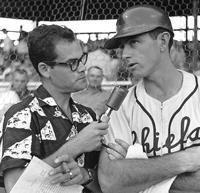
KING: Oh yeah. Well, it seems today that the trend in broadcasting is there’s not as much dues being paid at the bush level, so to speak. Guys get thrown into doing fairly major radio play-by-play with virtually no background, on a sink-or-swim basis. I don’t know whether the demands of the average listener are not as excessive today as they were in another era.
I spent nine years doing minor league baseball, and all those years was doing college football and basketball at the same time. Although I must say that by the time I came out here, several years before, I felt that I was more than ready to tackle whatever the challenge was in a major market, but the problem was getting the job done.
At that point, at least, no matter how many tapes or phone calls or visits to the coast I made, and that was a fairly good trek from the Midwest because that was where I was always interested in going, the job I was seeking always wound up going to either somebody who was on the scene and able to till the soil there every day and was known in the market, or perhaps some major name. So I decided back in 1958 that the best bet was to decide where I wanted to go and take a shot at it and pull up stakes and come wherever that was and go for it. That’s how I wound up coming to San Francisco.

THE BARD: What was your first big break when you got here?
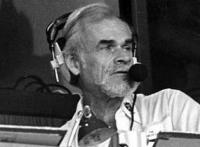
KING: I got here in June of ’58 and got a few odds and ends, things that happened during the summer; not much, but I made a few contacts and got to know people. I wound up as the color man with Bud Foster on the Channel 2 college basketball package on Saturday nights.
During that winter, among the people I had called on and became acquainted with was a fellow named Burt West, who was the sales manager at KSFO which, at that stage, was the Giants’ station and, of course, 1958 was the first year the Giants were here. That was KSFO about forty percent through the brilliant, almost legendary heyday of KSFO, which began to decline in the mid-sixties, but it was a phenomenon that has seldom if ever been known in broadcasting.
Anyway, because Chick Hearn (famed voice of the Los Angeles Lakers) is a good friend of mine, and Chick had left the Midwest the year before to come to L.A., I talked to him and he suggested I talk to Burt West. He’d been very involved in bringing Chick down there and he was very sports-oriented, as KSFO was very sports-oriented at that time. I saw him and we became acquainted and had a nice relationship, and during the course of that winter, in ’58 and ’59, they decided to add a third guy to the sports situation.
Lon Simmons was the Sports Director and number two to Russ Hodges on Giants baseball, so I wound up being sort of the Assistant Sports Director and Lon and I did a daily sports show together at 5:45, and I was the third guy in the Giants’ broadcast booth. That was the real breakthrough.
And coincidentally, within weeks of taking the job at KSFO, they had acquired Cal football and basketball for the first time, and there was a reshuffling of 49er announcing assignments. Bob Fouts had done 49er games on radio for years, and they moved him over to TV and Lon moved up to do the 49ers, so suddenly the Cal games were up for the picking and I wound up doing their games for four years, both football and basketball.
THE BARD: Since 1966, Raiders fans far and wide have known Bill King as “The Voice of the Silver and Black.” Does it really matter to you whether the Raiders play in Oakland or in Los Angeles?
KING: In one sense not really but in another sense… if they wind up coming back here I’m very pleased for the Oakland fans because, obviously, it’s almost a religion and it’s been a big void in people’s lives. Quite honestly, for me it will be less convenient than doing the games in L.A. That’s not anything that anybody cares about, but that is a fact because with the two teams sharing the same facility it means that always one will be halfway or two-thirds of the way or all the way across the country while the other is in the Coliseum.
In that eight-to-nine week period in August, September and, if the A’s are in post-season, into October, at least half the time the dates have fallen where, if I’m doing an A’s game Friday night, I can fly down to L.A. Saturday morning to do the Raiders exhibition and I’d be back for the A’s game Sunday, or once the regular season started, I’d have an A’s game Saturday afternoon, fly to L.A., do the game, and be back easily for Monday’s game and miss only one A’s game. I could miss more games per weekend if the schedule were that the team not at the Coliseum was not on the West Coast. And the odds are against that.
THE BARD: After leaving the Giants in 1962, you began long stints with the Warriors and Raiders. Then after almost twenty years away from baseball, you joined the A’s. Did you have a hard time dusting off the cobwebs?
KING: I didn’t have a problem, but it meant a tremendous amount of work and concentration in two ways, getting into the habit of thinking baseball within the game itself. First of all, getting to know the nuances of all the players. That was one of the early things, because they were just names and numbers in most cases, until you see them play a game, a series, a season series, and then you begin to know who’s a fastball hitter, who’s a bad-ball hitter, pitching characteristics…all of these things that you gradually assimilate the more you watch games and the more you watch the same players.
I had to start from scratch there because I’d been away from the game for eighteen years, and I mean literally away because for most of that time my format was basketball and football, with the summer open for four or five months depending on how far in the post-season the Warriors went. Those months were usually spent sailing, sometimes in the area or sometimes off cruising, Hawaii, Canada, places like that, and quite honestly I very rarely read anything about baseball. I’d get back and get involved in football and, along about September and World Series time, I’d pick up on who’s playing whom and I would have a feel for things during the World Series, but no feel of what had gone on during the season.
There were players who had five- and six- and seven-year careers during that span that had come and gone, and I really didn’t have any knowledge of their existence. It was a massive restructuring of the knowledge bank. But after the first year, then you develop a firsthand basis of reference. From that time on, it came rather easily. After two or three years, you had your book on everybody, literally and figuratively, and you’re into the swing of it. I’m eternally grateful that the Haas family (owners of the Athletics) wanted to take a chance on my being away that long.

THE BARD: When you left the Warriors several years ago, you broke the hearts of thousands of Bay Area basketball fans. Do you have any desire to ever call basketball games again?
 KING: I don’t have any burning desire to. If fate dictated that should be the case, I would do it. At the time I had that odd feeling that there was almost something wrong about giving up something that you do very well, not having lost any of the powers and so on, that nagging little sensation. But once away from it… (he laughs) it’s kind of interesting. All that time I was away from baseball, I mentioned I rarely saw a game except for the World Series on TV.
KING: I don’t have any burning desire to. If fate dictated that should be the case, I would do it. At the time I had that odd feeling that there was almost something wrong about giving up something that you do very well, not having lost any of the powers and so on, that nagging little sensation. But once away from it… (he laughs) it’s kind of interesting. All that time I was away from baseball, I mentioned I rarely saw a game except for the World Series on TV.
Since I left the Warriors at the end of the ’83 season, I believe I’ve seen five NBA games, and most of those I saw at the Coliseum were a case of not going to the game for the game, but to see friends of mine who I’d been friends with during my time in the league — people like Billy Cunningham, Stan Albeck, that type of thing. I read casually about what the Warriors are doing, and generally, I have a fair grasp of what the league is doing. I could pick up most box scores and probably seventy percent of the names are totally mysterious to me.
I’m not a sports fan in the sense of consuming everything I can get my hands on. I focus intently on the things I’m involved in, and when I’m involved with them I enjoy them immensely. I know that’s what happened with baseball: I had been enmeshed in baseball my whole life, from the time I was seven, and suddenly I found, my God! There are other things out there. And I enjoy doing other things. I didn’t miss it. And I found the same thing with basketball, which I guess leads me to the conclusion that I’m not a basic sports fan in the basic usage of the term.
THE BARD: Did you ever want to become a “Network Guy,” like a Brent Musburger or Marv Albert?
KING: No, for two reasons… (he laughs) or maybe three. The first and most important, although it isn’t really the prevailing reason, is that nobody ever asked me. Number two, those guys are “TV people,” which is not to say that doing television is easy by any manner of means. I personally find no satisfaction out of a telecast. You always know if you’ve had a good night or a bad night or a so-so night, but I’ve walked out of TV booths when I thought I had as close to a low percentage of error night that it’s possible to have, and yet never have the satisfaction I get almost every time I walk out of a radio booth.
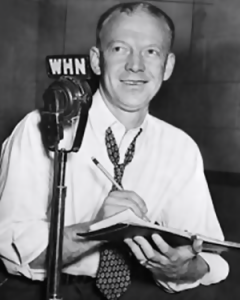
Red Barber said it in about 1950, when it became evident that TV was going to play an ever-increasingly major part in the coverage of sports. He said, speaking on behalf of announcers, that we had lost our autonomy. What that means is this, and it’s no criticism of directors because there are very good directors, but you are merely an instrument of the director in television, because the visual is virtually eighty percent. What you impart in anticipation, in guidance and in sort of leading people along the way, that’s very subtle and not an easy thing to do. That’s your main function.
One of the frustrating parts of it is that you, as an announcer, look at a game in a certain way. You’re viewing its various aspects as it evolves and so is the director. The director may see it legitimately in a different way: his story is such-and-such, so he takes a shot of this and you have to be alert to coincide with where he’s going. And sometimes you’ve just started a thought that’s going off in another direction, and you have to take a right angle to accommodate that.
It’s part of the game. That’s what goes with it, whereas on radio you select what you want to watch, anything you want to observe, select anything you want to comment on and how you want to lead the listener through the game. You are autonomous.
Then the other aspect is that radio is the theater of the mind. There’s nothing left to the imagination in television. On radio, you have to be all senses. That is the source of satisfaction. There’s a bit of the walking-the-high-wire aspect to it. If you blow the call on the instant of the play, you can recap brilliantly, but you’ll never have the opportunity to do it again. That’s the exhilaration and energy-creating force of doing radio.

THE BARD: Interviewers are always looking for new ways to ask questions without having to do much talking. No matter how hard we try, this one seems to do the trick best. We’d like to toss out a few names and get you to comment on them. First of all, Lon Simmons.
KING: Very professional. Great integrity. Unassuming, very caring person. Bizarre sense of humor. Always keeps you off balance. Delightful guy.
THE BARD: Raiders’ owner Al Davis.
KING: Al Davis is ever-fascinating, an enigma to many, perhaps even more so if people were able to see certain aspects of Al from being a little bit closer to him. Al has great feeling and great caring in areas that are not often explored or at all covered by the media. When you say something about a man with foresight, you often say, “Well, he’s several steps ahead of the game.” Most of the time that I’ve observed Al over all these years, I would say that when one guy is four steps ahead, Al’s about two blocks ahead. He has a great capacity to focus on whatever the issue is. And loyal. I would always put “loyal” in a word description of Al Davis.
THE BARD: Billy Martin.
KING: Probably one of the most complex human beings I’ve ever known. Billy had an incredible ability during a game to focus on the situation at hand and to be able to handle it and react to it. He was a man of total contrast. His soft side was so sentimental that it was almost embarrassing at times, and yet his stubborn and explosive side was sometimes at a point where you wondered if the man was really in possession of it all at that time. Fascinating to watch. A very loyal man.
I think Billy always felt as if he were the underdog. I’ve often said that if Billy managed four consecutive World Championships and was elected to the Hall of Fame, he would still feel as if he was the underdog. And that may have been one of the motivating reasons for his success.
THE BARD: How about Franklin Mieuli, the former Warriors owner?
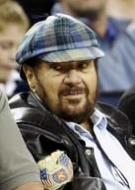
KING: (Laughs.) God, you’re pulling ’em out. “Sentimental” would be the first word I’d use to describe Franklin. A strong sense of loyalty and a strong feeling of liking to have people he knew he could trust around him. Franklin is almost a “Professional San Franciscan,” but it’s legitimate, it’s genuine, his love for San Francisco and the Bay Area.
Of course, one of the great things about Franklin was that convention was not a restriction to him. From when I first knew him, he was very conventional: white sidewall haircut, narrow ties, the whole thing. But when he let himself go in the early ‘Sixties, he really broke out.
I can remember when he was still very, and I quote, “legitimate.” He was the producer of Giants baseball and, before he became majority owner of the Warriors, he was involved in radio and TV negotiations as a small owner. But at one point in there I grew the beard, in 1962. It was a matter of curiosity. I took a two-week vacation during baseball season because I was number three and I wasn’t that vital. We were sailing down the coast and always I’d had just an idle curiosity what I’d look like in a beard.
When I came back, and remember, this was before the hippie era — before it was accepted for people to have facial hair — especially in the halls of sports and particularly in baseball and college sports where everybody had the squeaky-clean crew cuts and so on, they looked at you with great suspicion. And although I had the beard neatly trimmed, I told the station manager, “If it bothers you, don’t worry about it. I just did it for fun, but it looks pretty decent.” He said, “I don’t really care.” Franklin, of course, had the perfect answer. He said, “Well, I can’t say I like it, but somethin’ had to be done!”
In the early years of his ownership with the Warriors, when he had more and more to do with it, we had a big beef. We had a limited television schedule; we only telecast seven games — the games we played against the Lakers in L.A. when the NBA only had ten teams. I was the Warrior broadcaster and supposedly the telecaster, too. Well, Channel 2 had such a problem with this beard thing that they were almost having a paroxysm: (affecting an authoritative voice) “We can’t have this on TV! We just cannot! It’s horrible!” And Franklin said, “You guys are crazy. What the hell does it matter?”
Finally Franklin came up with the ultimate solution. He should have been negotiating the baseball owners and players (during the lockout). What we did for those seven games was, I did the telecast. But another announcer opened the broadcast on camera, introduced this disembodied voice, “Bill King,” who did the entire telecast, and then the other announcer came on and closed the telecast so this horrible vision of beardedness would never appear and scare the daylights out of the Bay Area. That was Franklin’s way of solving it.
THE BARD: How about the great Russ Hodges?
KING: Oh, Russ. Russ was another guy who was as laid back as you could be, and yet that did not mean he wasn’t professional. He had a great sense of humor. Unpretentious, as far as his personal demeanor was concerned. Russ knew who he was and how important he was, but unless you were not doing your job, he was as easy to get along with as an old shoe. I would get very, very astute bits of advice from Russ.
Russ was a guy who loved a good time. He loved a good time and knew the game of baseball inside and out. I think his greatest strength was not so much the descriptive as it was his insight and anticipation of the game. And that, by the way, is one of Lon’s great strengths. Not that he isn’t strong in all areas, but his anticipation and his insight is terrific.
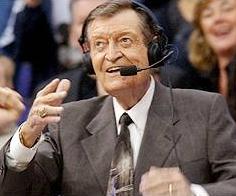
THE BARD: Chick Hearn.
KING: Chick and I go back almost forty years. I was just a kid in Peoria and he had worked as a pharmaceutical salesman for several years. I think he was 27 or 28 years old before he started broadcasting, then he came to Peoria. We were both doing the Bradley basketball games, again in an era of non-exclusivity. There were three stations and three announcers, all doing their broadcasts of Bradley in those days, traveling wherever they went.
Chick and I got to know each other very well. Extremely intense worker, one of the hardest preparers in sports, and that’s something I respect because I consider myself a strong preparer. A man who is totally in love with the job of sports broadcasting.
Chick is a bright man with a very fine mind, but I don’t think Chick is interested in much of anything else in the whole world than sports and sports broadcasting. This is not a criticism. It’s just that he is so totally focused and it gives him such great pleasure. And as a play-by-play man, he’s the best I’ve ever heard.

THE BARD: In only your tenth year since returning to baseball, you’ve had to sit through three different labor-related delays. Do you, like a lot of fans, get disillusioned when America’s Pastime is overrun by unions, strikes and lockouts?
KING: I don’t get disillusioned because I recognize that it’s a way of life today. That’s generally the way of life in America overall. Because the game originated, literally, as just a game for amusement in a small-town manner, that really flies in the face of what it really has become. To deny that it’s big business is ludicrous. Whether you approve or don’t approve of the salaries, that’s another question. I think the area that people get upset at is not that Paul Molitor signs a nine-million dollar contract for three years, or Rickey Henderson signs a huge contract. The marquee players are comparable to your stars in Vegas, for example. But the difference ends there because, although some of your second-line players are very important, you’ve got to have indians as well as chiefs.
The fact is that second-line players’ awards are so incredible. It’s like paying Sammy Davis, Jr., fifty grand at the Sands, and then paying every man in the band twenty-five grand. That’s where I think it’s out of whack, but if there’s that kind of money out there, and the owners are willing to pay it and still make a profit, then that’s really the way that life operates in America today. It’s unfortunate that all of us have the recollection of playing the game for amusement and entertainment as kids, and so it’s a little bit hard to come to grips sometimes with where it’s gone, but I really find no problem with it.
THE BARD: You’ve been behind the microphone for four Super Bowls, two World Series and three NBA World Championship Series. In all your years of sportscasting, what is your most outstanding memory?
 KING: In 1964, the Warriors lost to Boston, four games to one, and in ’67 we lost to Philadelphia, four games to two, in a great series: Wilt against Nate, Rick Barry against Billy Cunningham, Luke Jackson and Hal Greer, Larry Costello in the backcourt. It was a hellacious pair of teams. The Warriors were just a young team beginning to emerge, and I don’t think they realized until the middle of that series how good they were, and then they had only a few more games together because that’s when Rick left for the ABA.
KING: In 1964, the Warriors lost to Boston, four games to one, and in ’67 we lost to Philadelphia, four games to two, in a great series: Wilt against Nate, Rick Barry against Billy Cunningham, Luke Jackson and Hal Greer, Larry Costello in the backcourt. It was a hellacious pair of teams. The Warriors were just a young team beginning to emerge, and I don’t think they realized until the middle of that series how good they were, and then they had only a few more games together because that’s when Rick left for the ABA.
But I would say, probably not one instant or even one game, but the four games of the finals in 1975 with the Warriors because they were so lightly regarded by the entire basketball world, and they wound up with only the second four-game sweep, I believe, since 1960. That was such an astounding story. I think that was probably the highlight.
I can give you individual games that were almost hysterical in their ultimate effect, but by the same token, winning the whole thing and winning it that way… the morning of that first game, which was a Sunday in Washington, there was a TV show on with several writers and broadcasters.
The consensus was that the Warriors might win one game in the series, but nobody could figure out why except that, well, (sarcastically) “They just probably will. That’s the way things go.” That’s how lightly they were regarded. Yet the night before, Rick Barry and I were going out with a mutual friend of ours to a dinner theater, and we waited down in the lobby for Rick and he was late. He came down and he had a bounce in his step, and he said, “Jesus, we’re going to beat these guys. I was just watching the videotape.”
The last game we played against the Bullets was February 6, and that was the game in which they called a phantom foul on (Warrior) Butch Beard at the buzzer and Phil Chenier hit two free throws after time had expired and won the game. And Rick says, “Those two teams that played that night, I’ve watched our films and I’ve watched their films in the playoffs. There’s no comparison! We’re gonna beat these guys and really handle ’em.” Well, strangely enough, I had my doubts because in the first game we were down by sixteen at the half, but we came back to win it, and he was right.
THE BARD: Do you have any further aspirations, or are you content with what you’ve accomplished over the years?
KING: I don’t know. I’ve never thought of it. (Laughs.) I really haven’t. I suppose you could say that I’d like to announce the final game and the final out of a winning World Championship for the A’s, because during the earthquake period (when the World Series was delayed) I came down with laryngitis and couldn’t broadcast the final two games of the series. But that’s about it. I suppose this is already wordy enough for you. (Laughs.)

Copyright © 1990 by Jason Jackson. Reprinted with permission of the author. All rights reserved.
RELATED EXHIBITS:
![]()
